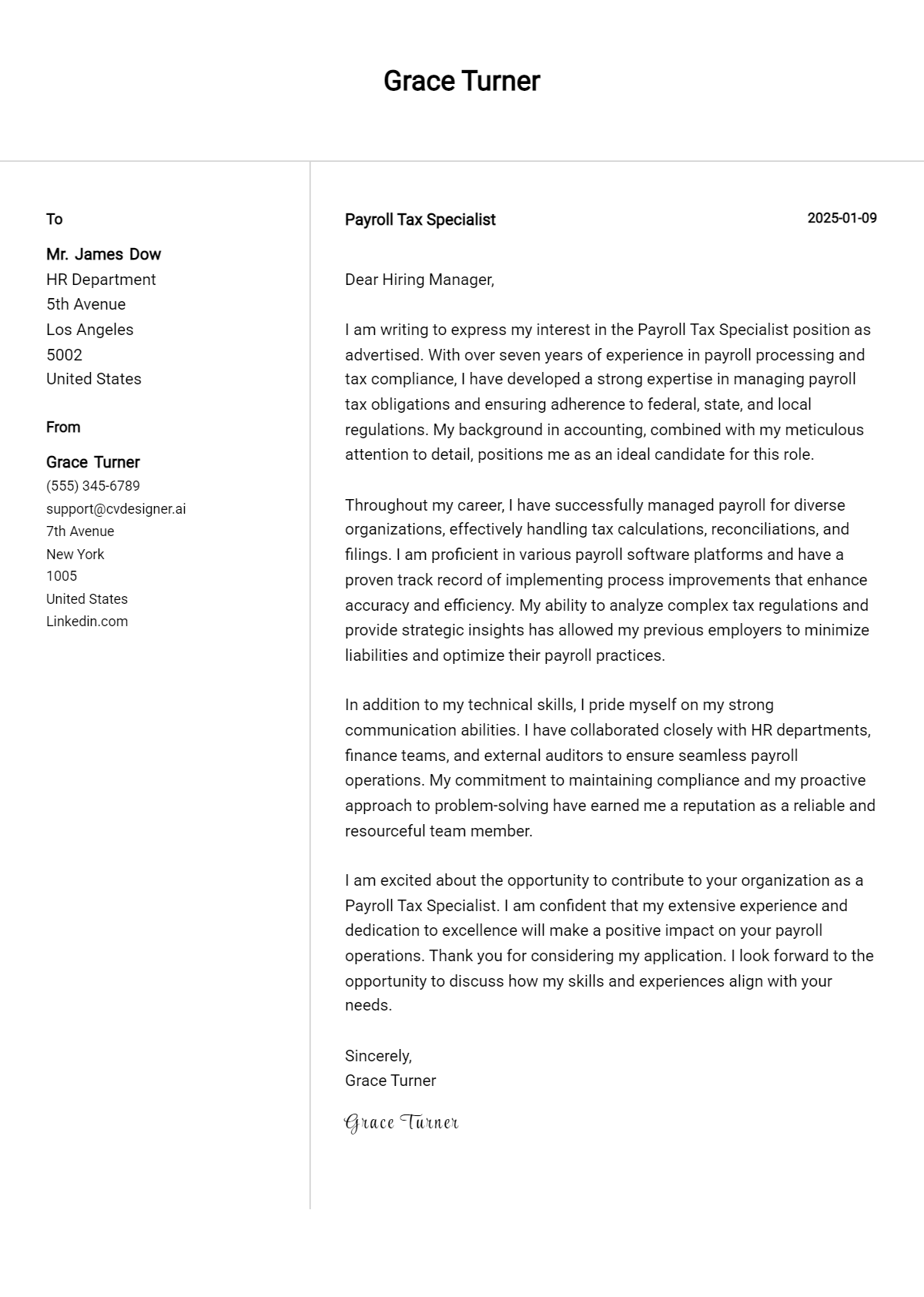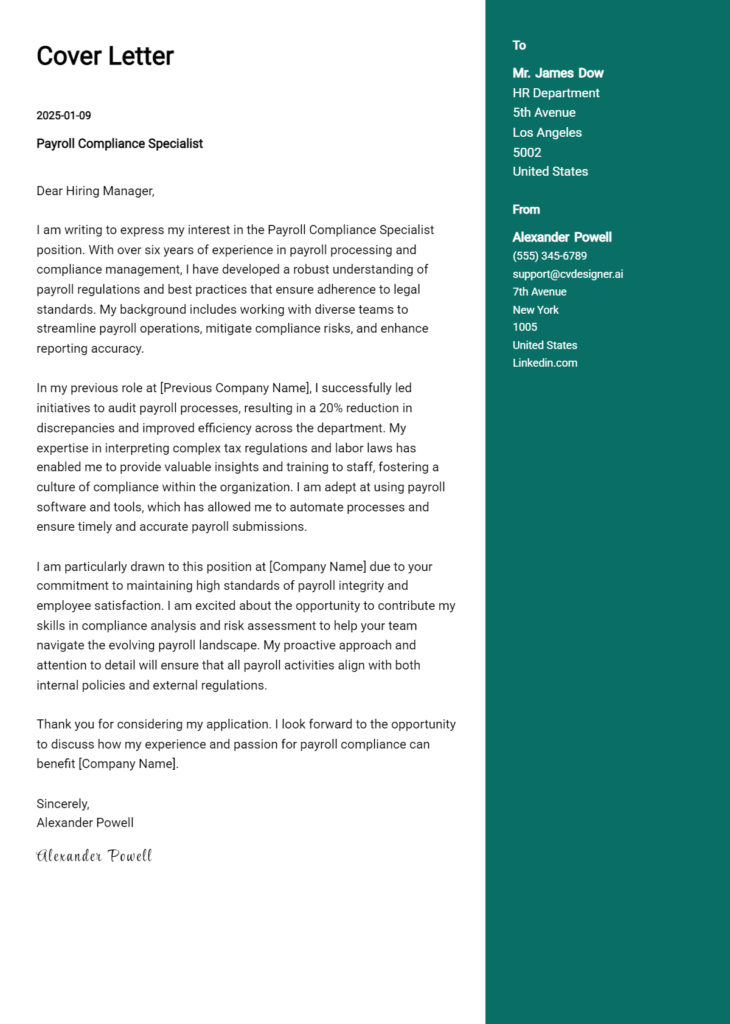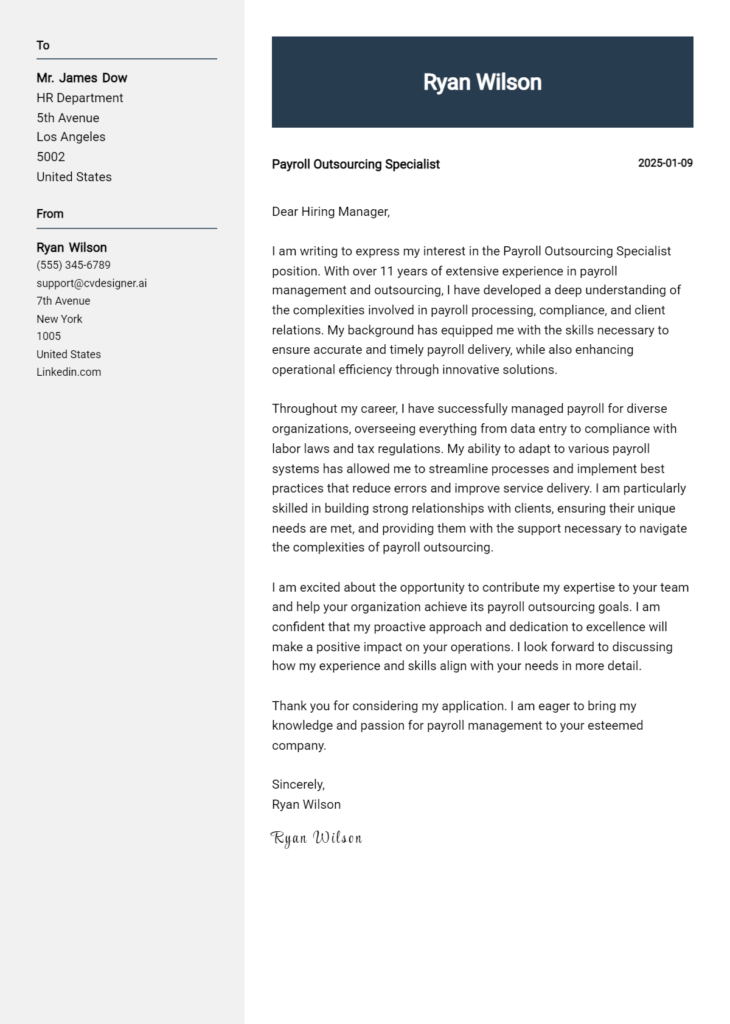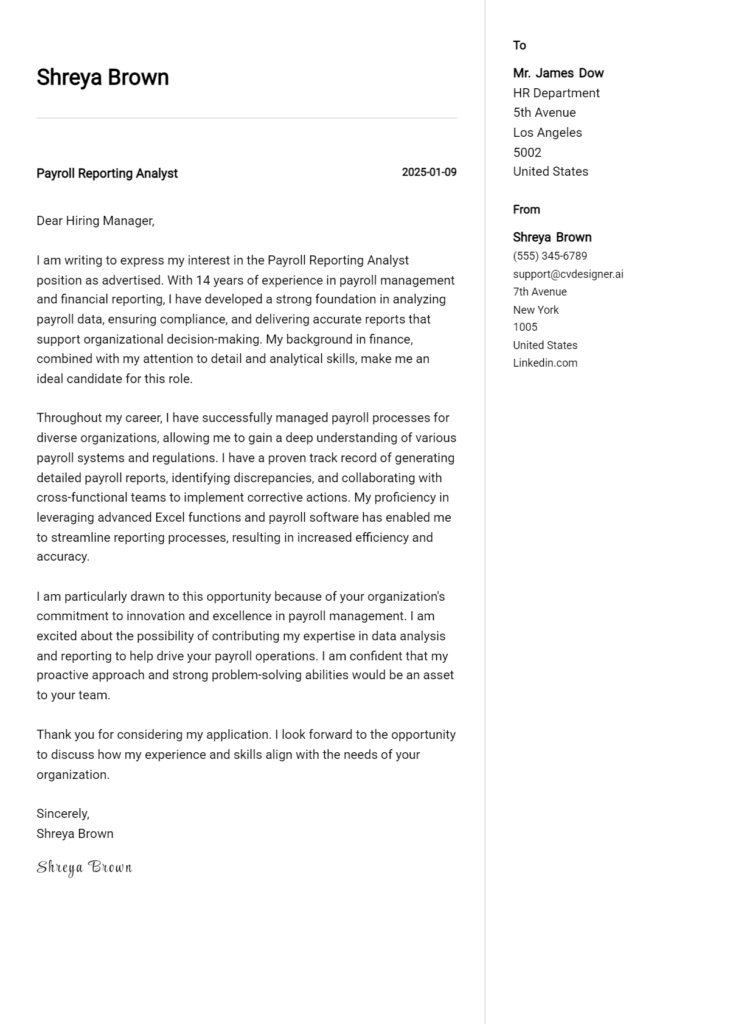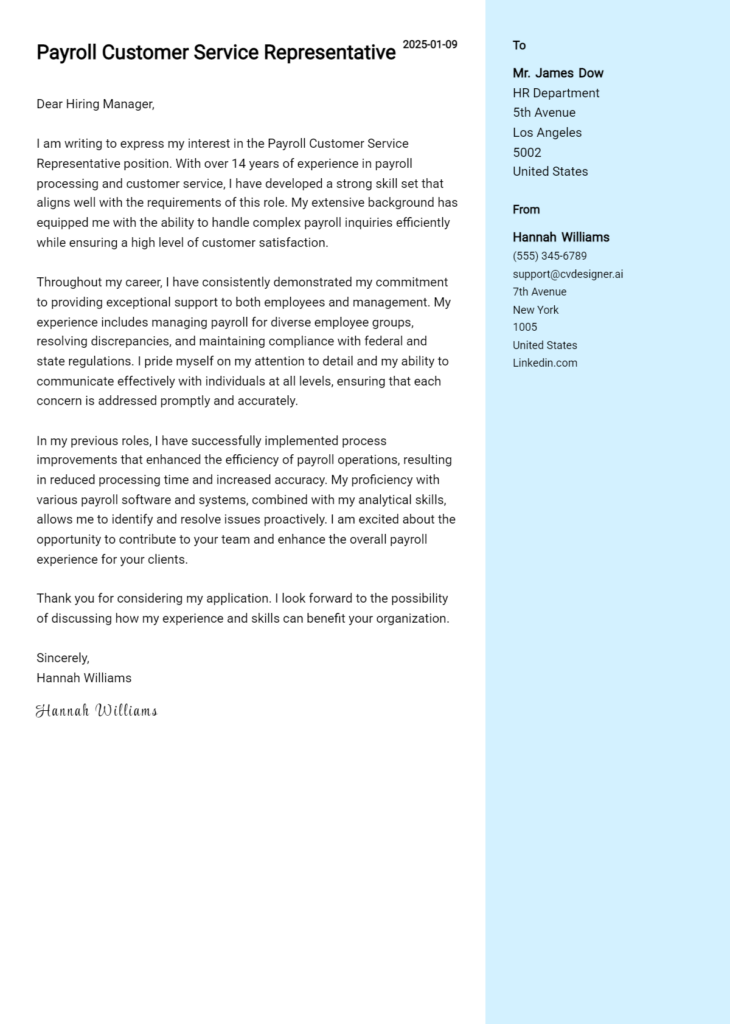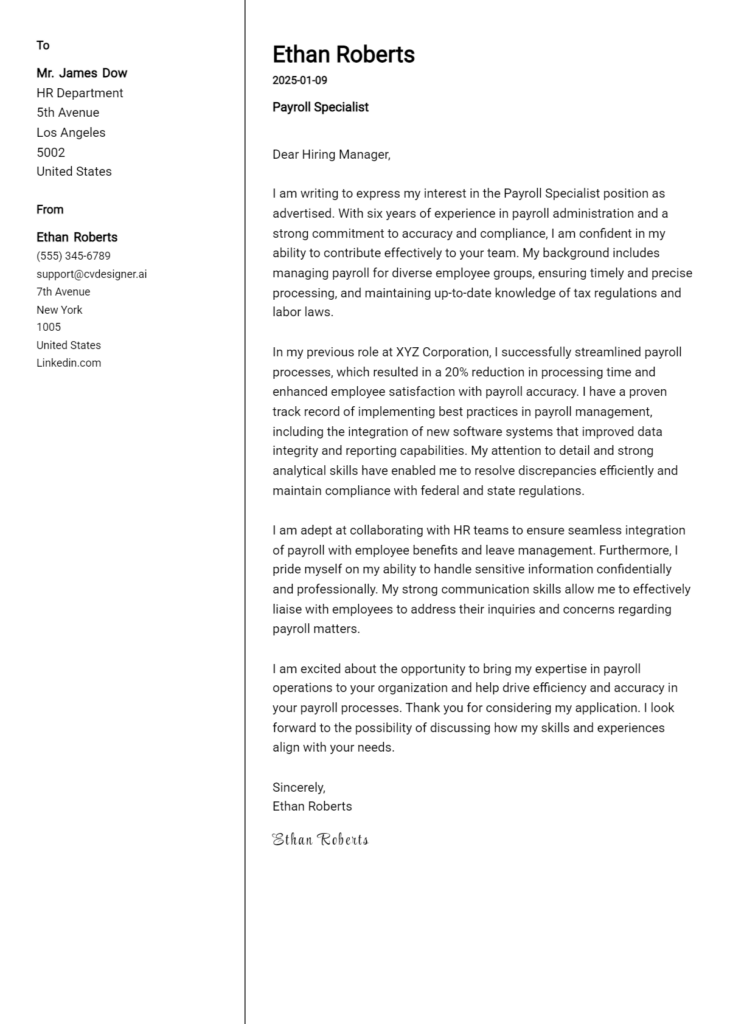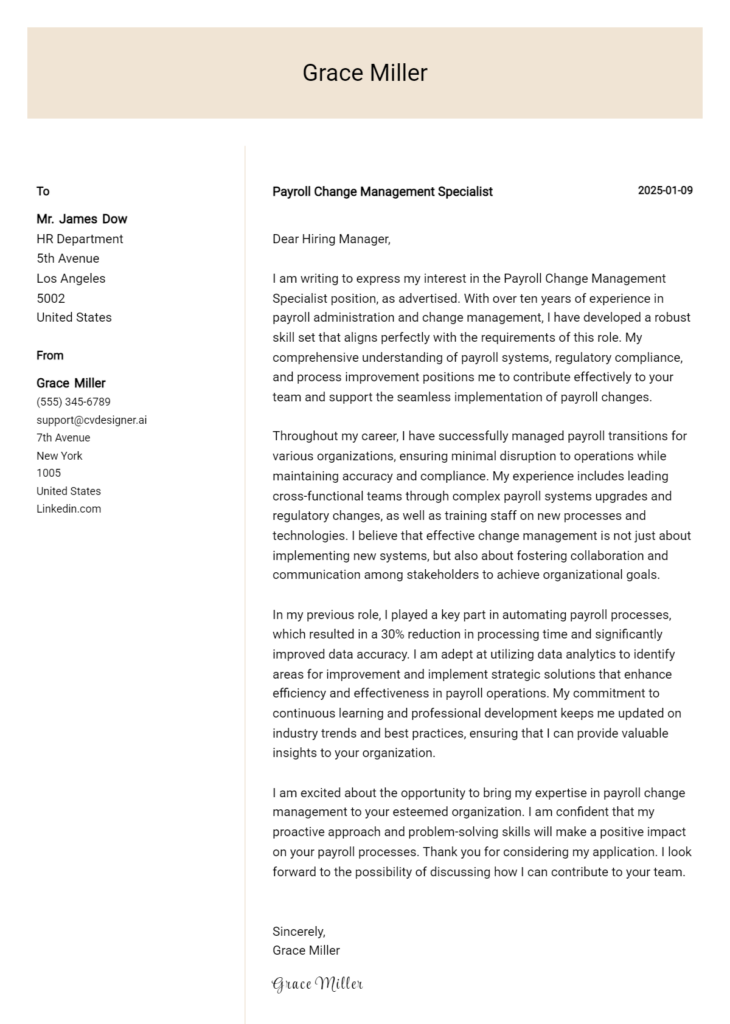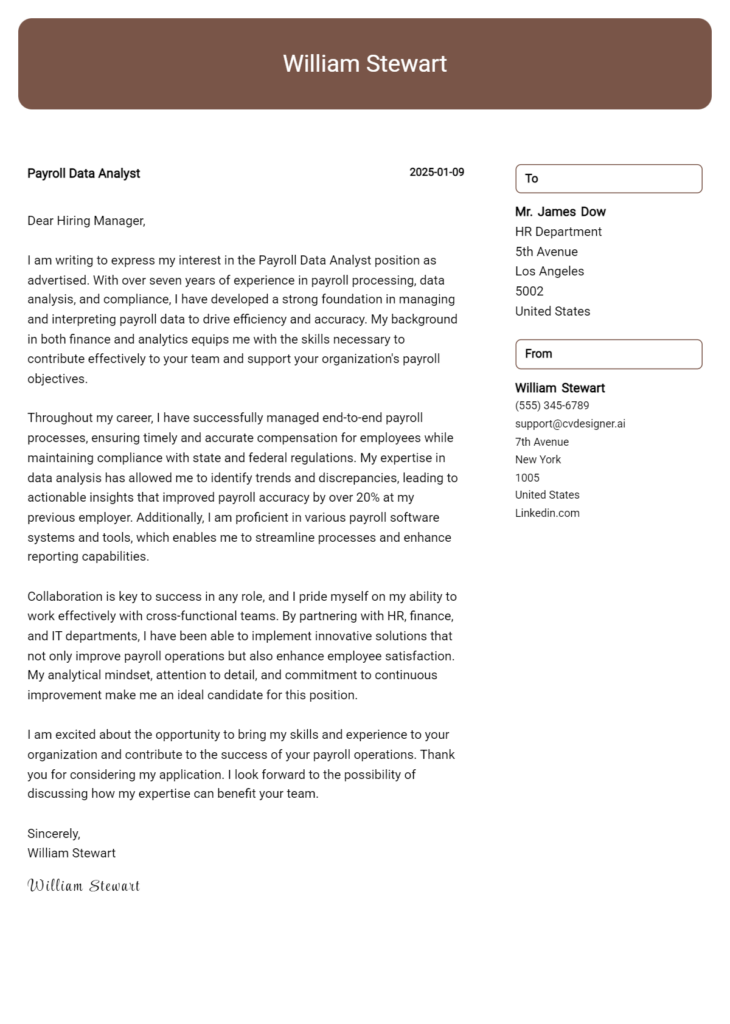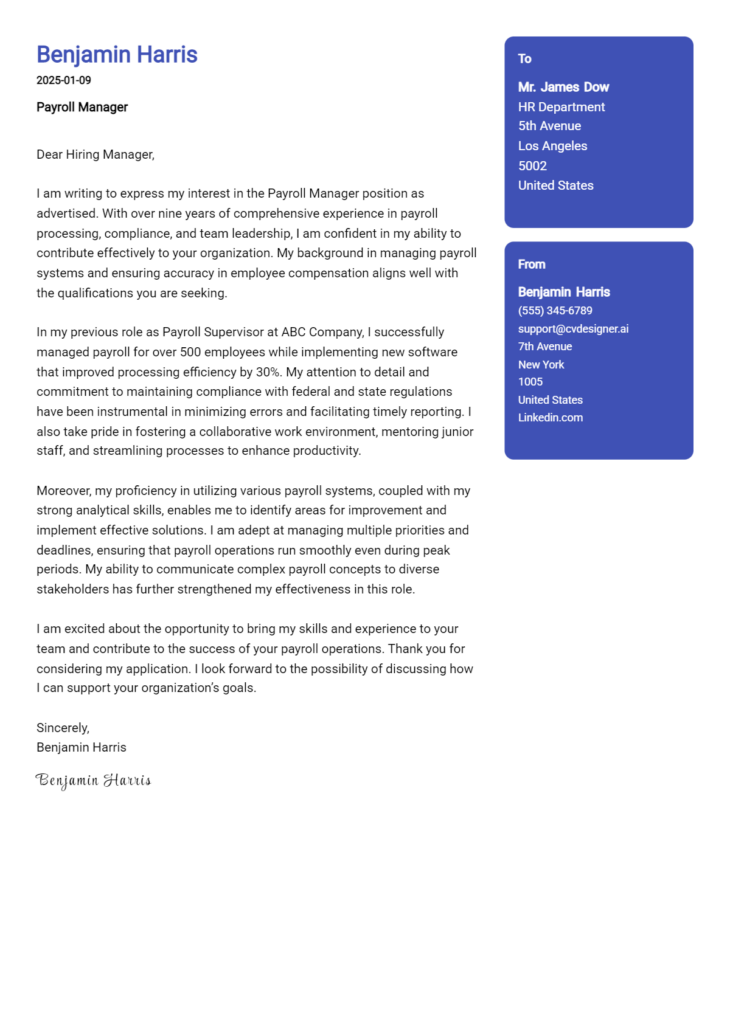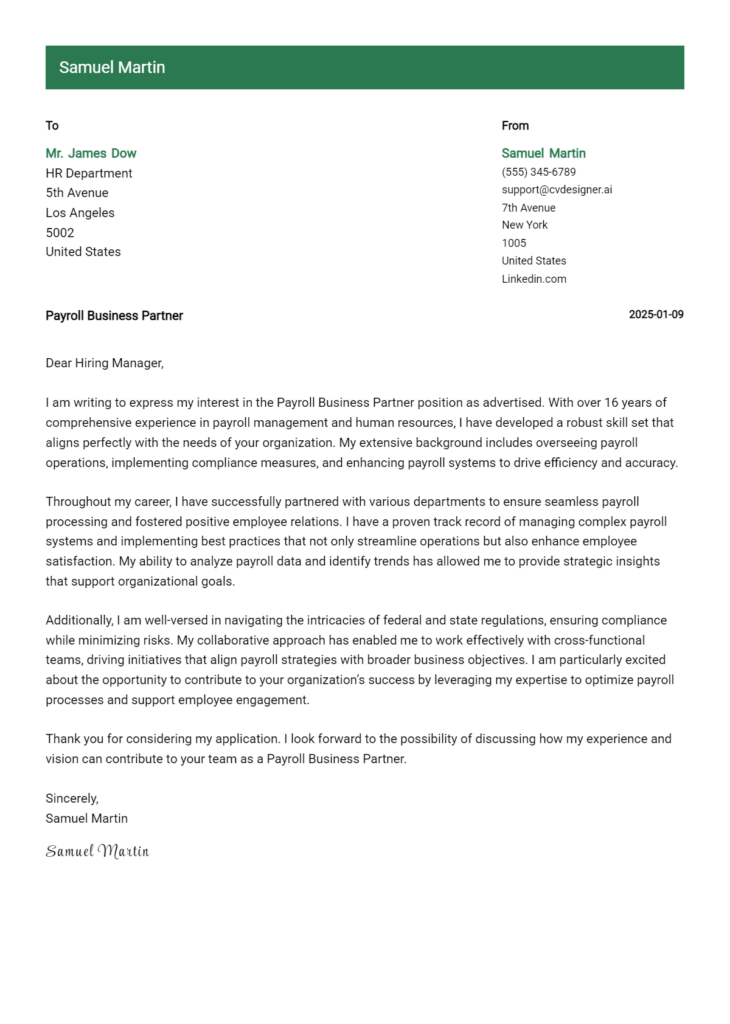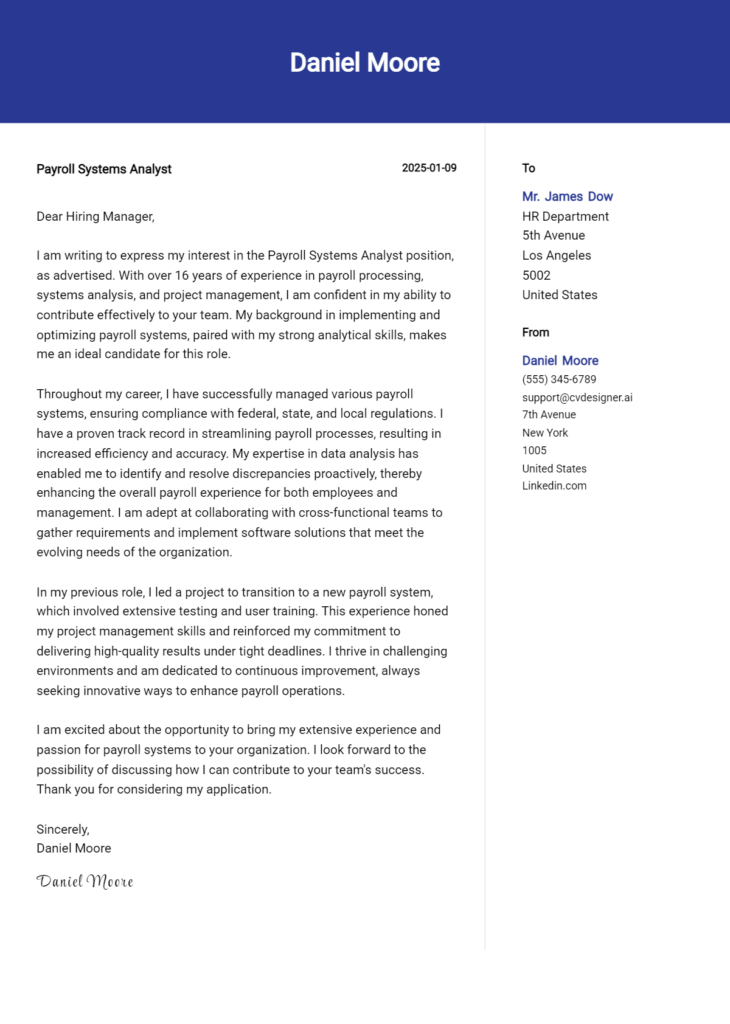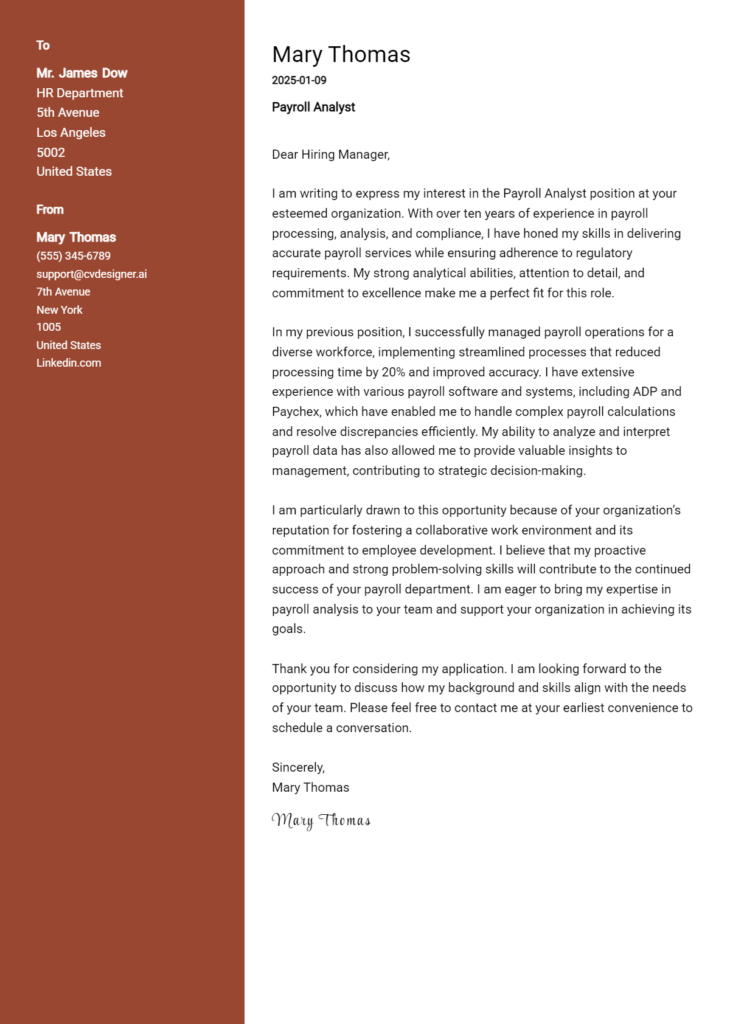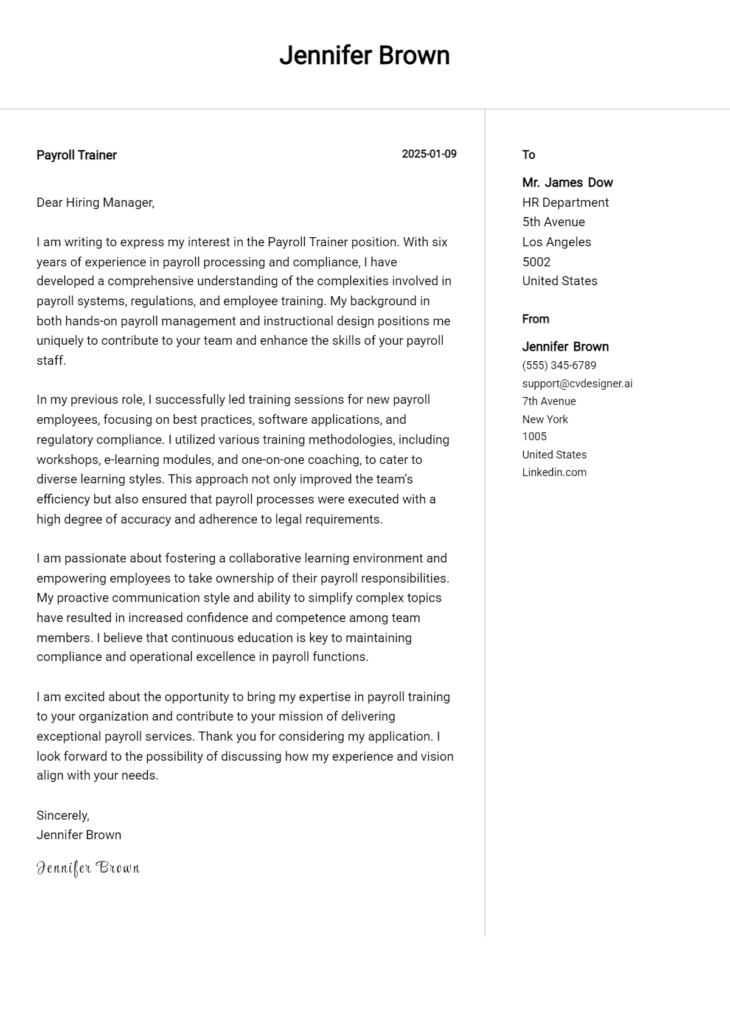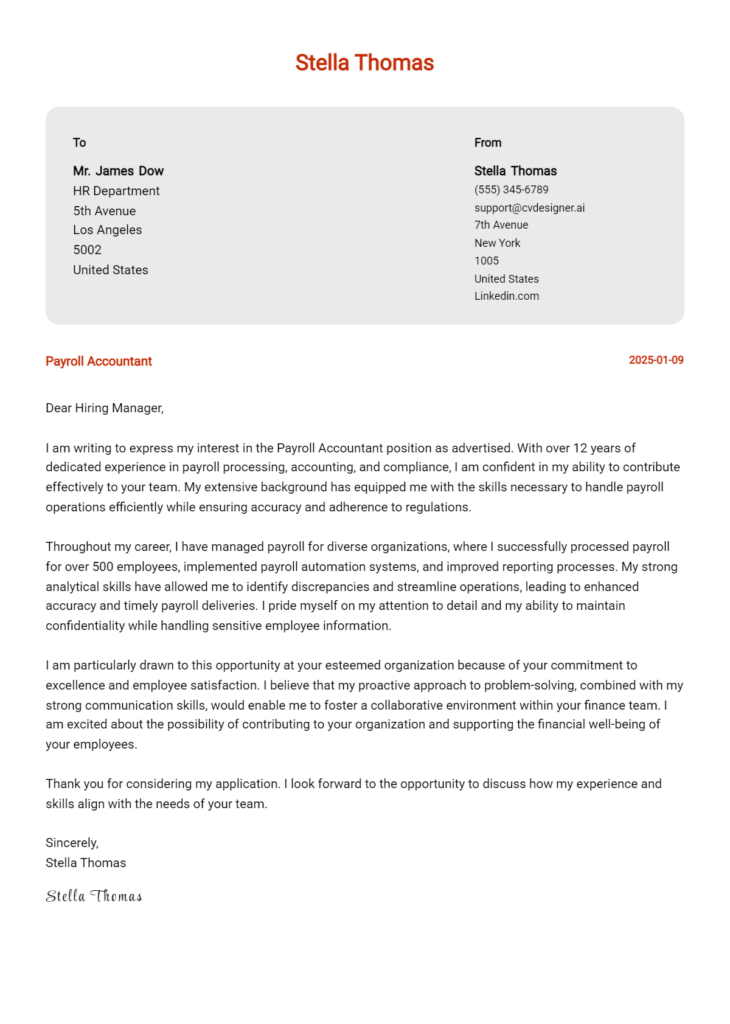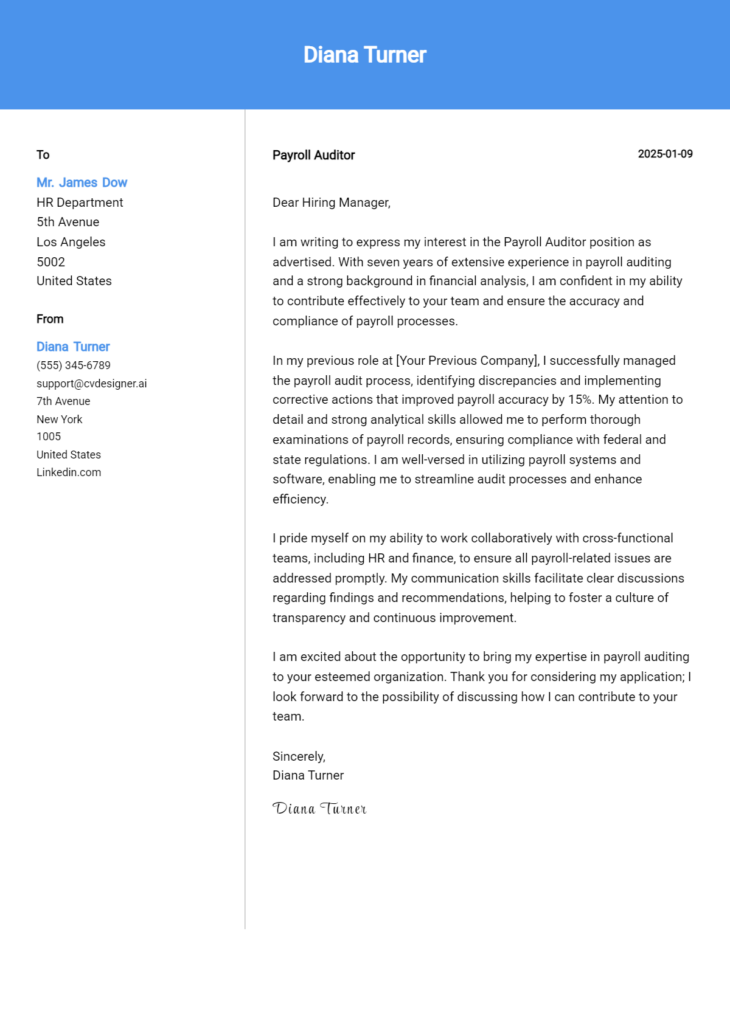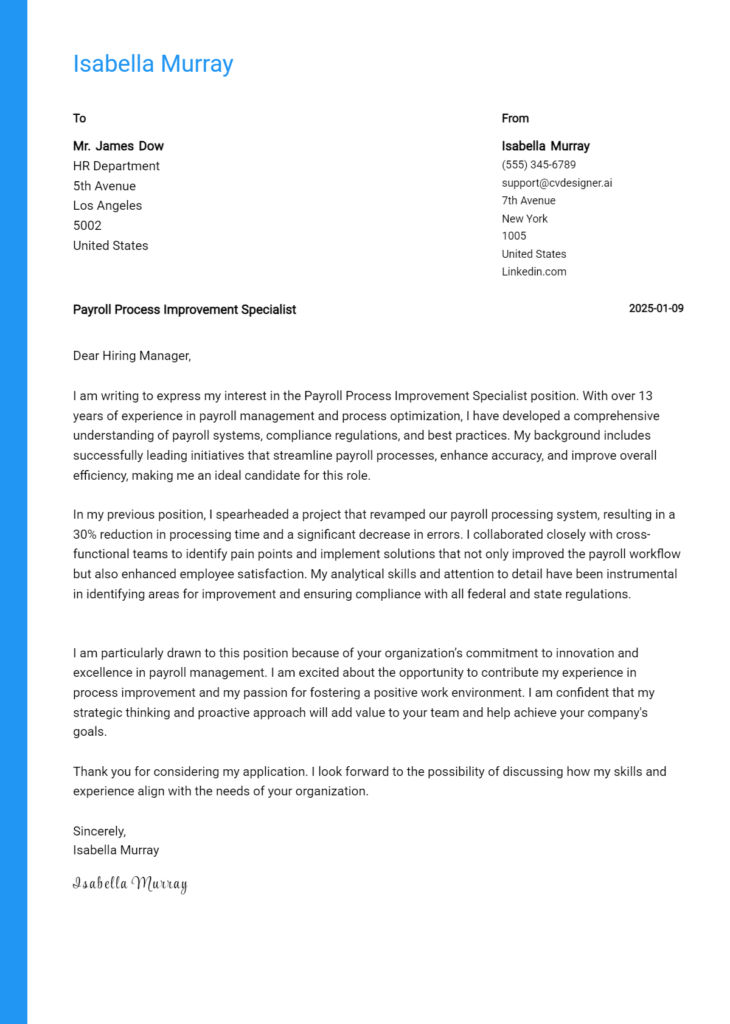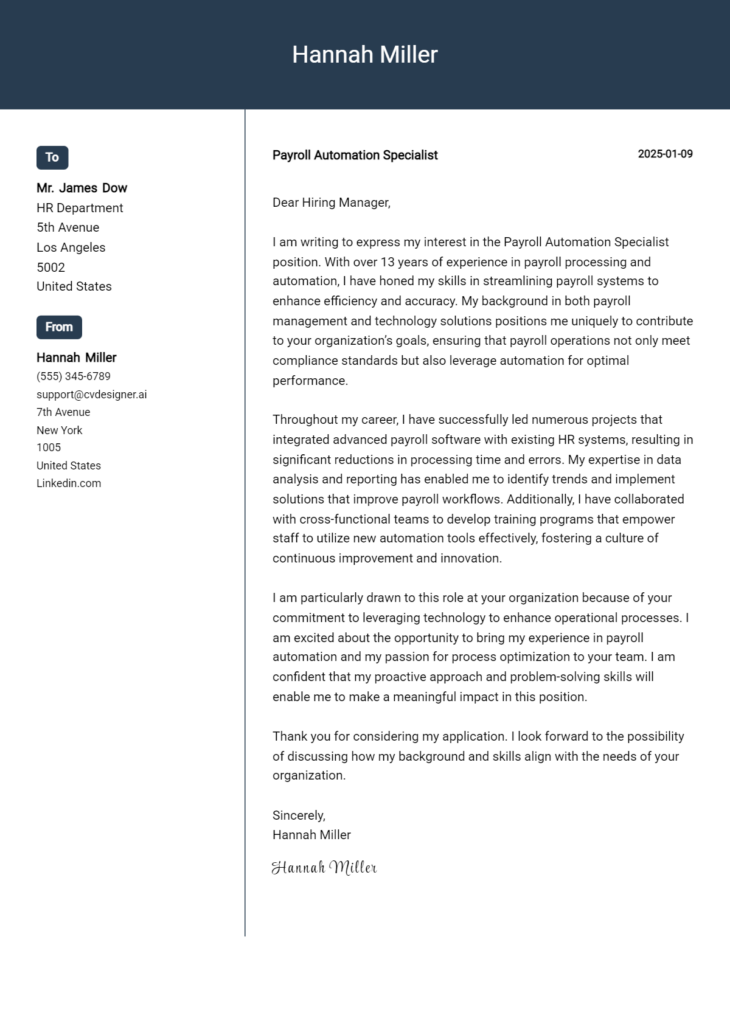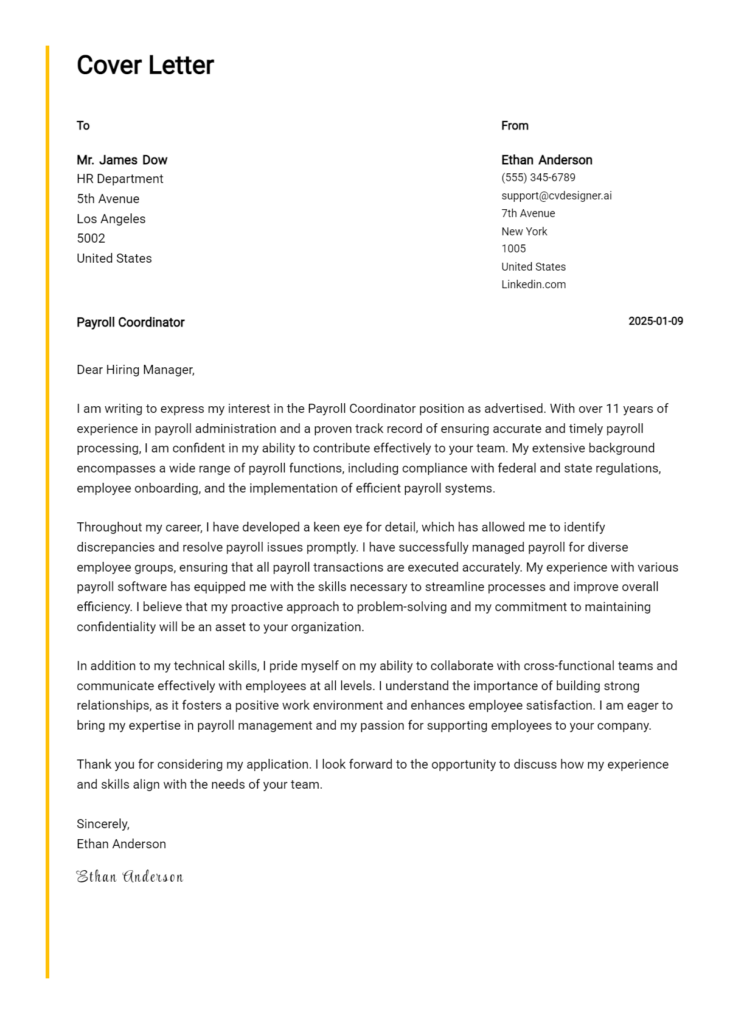Payroll Tax Specialist Cover Letter Examples
Explore additional Payroll Tax Specialist cover letter samples and guides and see what works for your level of experience or role.
How to Format a Payroll Tax Specialist Cover Letter?
Crafting an impactful cover letter is essential for a Payroll Tax Specialist, as it not only showcases your qualifications but also reflects your expertise in navigating complex tax regulations. The format of your cover letter is a vital aspect that can significantly influence the hiring manager's perception of your professionalism and attention to detail—qualities that are indispensable in the payroll tax field.
In this guide, we will outline how to structure your cover letter effectively, providing insights and industry-specific examples to help you create a persuasive document.
We will focus on the essential components of a professional cover letter, including:
- Cover Letter Header
- Cover Letter Greeting
- Cover Letter Introduction
- Cover Letter Body
- Cover Letter Closing
Each section is crucial in presenting your qualifications and demonstrating your commitment to excellence. Let’s delve into each part and explore ways to make your Payroll Tax Specialist cover letter stand out.
Importance of the Cover Letter Header for a Payroll Tax Specialist
The cover letter header is a critical component of your application as a Payroll Tax Specialist. It establishes the first impression and sets the tone for your professionalism and attention to detail. A well-structured header should include your contact information, the date, and the recipient's details. Clarity and professionalism in this section not only facilitate easy communication but also demonstrate your organizational skills, which are vital in payroll and tax functions.
A strong header reflects your meticulous nature, while a weak one can undermine the overall impact of your application. Below are examples of both a strong and a weak cover letter header.
Strong Example
Jane Doe 123 Main Street Anytown, NY 12345 (555) 123-4567 jane.doe@email.com October 1, 2023 John Smith Hiring Manager XYZ Corporation 456 Corporate Blvd Business City, NY 67890
Weak Example
jane doe 123 main st anytown ny 555-123-4567 10/1/23 john smith xyz corp 456 corporate blvd
The Importance of a Personalized Cover Letter Greeting
The greeting of your cover letter is crucial in establishing an immediate connection with the hiring manager. It sets the tone for the rest of your letter, demonstrating your professionalism and attention to detail. Addressing the hiring manager directly not only personalizes your application but also shows that you have taken the time to research the company and the role for which you are applying. To avoid a generic greeting, consider looking up the name of the hiring manager through the company's website or LinkedIn. This small effort can significantly enhance your cover letter's impact.
Strong Greeting Examples for a Payroll Tax Specialist Cover Letter
Dear Ms. Johnson,
Weak Greeting Examples for a Payroll Tax Specialist Cover Letter
To Whom It May Concern,
The Importance of a Well-Crafted Cover Letter Introduction for a Payroll Tax Specialist
A compelling cover letter introduction is crucial for a Payroll Tax Specialist, as it sets the tone for the entire application. This initial paragraph serves to grab the hiring manager's attention, conveying not only the candidate's enthusiasm for the position but also a glimpse of their qualifications. A strong introduction will highlight relevant skills and achievements, making a memorable first impression that encourages the reader to delve deeper into the application. In contrast, a weak introduction may fail to engage, leaving the hiring manager unimpressed and uninterested. Below are examples demonstrating the difference between a strong and weak cover letter introduction.
Strong Example
Dear [Hiring Manager's Name], I am excited to apply for the Payroll Tax Specialist position at [Company Name], where I can leverage my over five years of experience in payroll processing and tax compliance to contribute to your esteemed team. My dedication to accuracy and efficiency has enabled me to successfully manage payroll tax audits and implement streamlined processes that saved my previous employer 15% in operational costs. I am eager to bring my expertise and passion for payroll tax management to [Company Name] and support your commitment to excellence.
Weak Example
To whom it may concern, I am writing to express my interest in the Payroll Tax Specialist position. I have some experience in payroll, but I am still learning about tax compliance. I hope to get the job because I need a new opportunity and think it might be a good fit.
Cover Letter Body for Payroll Tax Specialist
The body of a cover letter for a Payroll Tax Specialist serves as a critical component in demonstrating the candidate's qualifications, expertise, and potential contributions to the organization. This section should effectively convey the applicant's relevant skills and experiences, particularly through specific projects or accomplishments that showcase their ability to manage payroll tax compliance, optimize processes, and deliver value to the company. By articulating these points clearly, candidates can differentiate themselves from others in the job market and position themselves as ideal fits for the role.
Strong Example
I have spent over five years as a Payroll Tax Specialist, where I successfully managed payroll tax compliance for over 1,500 employees across multiple states. One of my proudest accomplishments was leading a project that streamlined our tax reporting process, reducing errors by 30% and improving submission timelines by a week. Additionally, I developed a comprehensive training program for our HR team, which enhanced their understanding of payroll tax regulations and reduced inquiries to the payroll department by 40%. This experience has equipped me with the expertise needed to not only maintain compliance but also to drive process improvements that can enhance the overall efficiency of the payroll function at your organization.
Weak Example
I have worked in payroll for a few years and understand tax laws. I think I would be good for this job because I can do the work. I have done some projects but can't remember the details. I hope to learn more about payroll tax if given the chance. I really want to be part of your company.
Importance of the Cover Letter Closing for a Payroll Tax Specialist
The closing paragraph of a cover letter is crucial as it serves to summarize your qualifications, express your enthusiasm for the Payroll Tax Specialist role, and encourage the hiring manager to take the next steps, such as reviewing your resume or scheduling an interview. A strong closing leaves a lasting impression, reinforcing your fit for the position and your eagerness to contribute to the organization. Conversely, a weak closing may leave the reader with a lack of clarity about your interest or qualifications.
Strong Example
Thank you for considering my application for the Payroll Tax Specialist position at [Company Name]. With my extensive experience in payroll compliance and tax regulations, coupled with my strong analytical skills, I am excited about the opportunity to contribute to your team. I look forward to the possibility of discussing my application further and am eager to bring my expertise to [Company]. Please feel free to contact me to schedule a convenient time for an interview. Thank you once again for your time and consideration.
Weak Example
I hope you like my resume. I think I would be good at this job. If you want to talk, you can call me sometime. Thanks for reading my letter.
Common Mistakes to Avoid in a Payroll Tax Specialist Cover Letter
Crafting a compelling cover letter is essential for standing out as a Payroll Tax Specialist. Avoiding common mistakes can significantly enhance your chances of making a positive impression on potential employers. Here are some frequent pitfalls and tips on how to sidestep them:
Generic Content: Using a one-size-fits-all approach can diminish your letter's impact. Tailor your cover letter to the specific job and company by including relevant details and examples that align with their values and requirements.
Lack of Focus on Skills: Failing to highlight key skills such as tax compliance, attention to detail, and analytical abilities can weaken your application. Clearly outline your relevant skills and provide examples of how you've successfully applied them in past roles.
Ignoring the Job Description: Not addressing the specific qualifications and responsibilities mentioned in the job posting can indicate a lack of interest or effort. Carefully read the job description and incorporate keywords and phrases that resonate with the employer’s needs.
Poor Formatting: A cluttered or unprofessional format can distract from your message. Use a clean, professional layout with clear headings and bullet points for readability, ensuring your contact information is prominently displayed.
Spelling and Grammar Errors: Typos and grammatical mistakes can undermine your professionalism. Always proofread your letter multiple times and consider using tools or asking a friend to review it for errors.
Overly Long or Short Length: A cover letter that is too lengthy can lose the reader's interest, while one that is too brief may lack necessary details. Aim for a concise yet informative letter, ideally one page in length, focusing on your most relevant experiences.
Neglecting to Express Enthusiasm: Failing to convey your passion for the role and the company can make your application feel lackluster. Show genuine interest by expressing what excites you about the position and how you can contribute to the company’s success.
By steering clear of these common mistakes, you can create a polished and effective cover letter that highlights your qualifications as a Payroll Tax Specialist.
Cover Letter FAQs for Payroll Tax Specialist
What should I include in my cover letter for a Payroll Tax Specialist position?
In your cover letter, highlight your relevant experience in payroll processing, tax compliance, and regulations. Mention any certifications or degrees related to accounting or payroll management, such as a Certified Payroll Professional (CPP) designation. Emphasize your familiarity with payroll software and tax reporting systems. Include specific examples where you have successfully resolved payroll discrepancies or ensured compliance with tax laws. Additionally, express your understanding of the importance of accuracy and attention to detail in payroll processing and tax filings. Tailor your cover letter to the job description, demonstrating how your skills align with the organization's needs.
How can I demonstrate my expertise in payroll tax regulations in my cover letter?
To demonstrate your expertise in payroll tax regulations, include specific references to your knowledge of federal, state, and local tax laws. Discuss your experience with filing payroll tax returns, managing audits, and staying current with regulatory changes. You could mention any training or workshops you've attended that relate to payroll tax compliance. Highlight your problem-solving skills by providing examples of how you've navigated complex tax situations or resolved compliance issues in previous roles. By showcasing your proactive approach to staying informed and your ability to implement best practices, you will assure potential employers of your expertise.
Should I include my achievements in my cover letter?
Absolutely! Including your achievements in your cover letter can set you apart from other candidates. Quantify your accomplishments wherever possible, such as "reduced payroll processing time by 20%" or "successfully managed a payroll audit resulting in zero discrepancies." Discuss any process improvements you implemented that enhanced efficiency or compliance. Highlighting your contributions not only demonstrates your skills but also shows potential employers the value you can bring to their organization. Remember to align your achievements with the specific responsibilities listed in the job description to reinforce your fit for the role.
How should I format my cover letter for a Payroll Tax Specialist role?
When formatting your cover letter, start with your contact information at the top, followed by the date and the employer's contact details. Use a professional font and a standard business letter format. Begin with a strong opening paragraph that captures attention and states the position you're applying for. Use clear, concise language throughout; aim for three to four paragraphs, ensuring each has a clear focus. In the closing paragraph, express your enthusiasm for the role and encourage further discussion. Finally, include a professional closing (e.g., "Sincerely") followed by your name. Keep the letter to one page to maintain conciseness and readability.
Build your Cover Letter in minutes
Use an AI-powered cover letter builder and have your letter done in 5 minutes. Just select your template and our software will guide you through the process.

